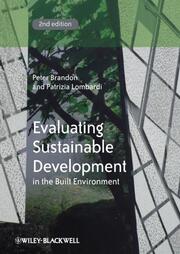Detailansicht
Evaluating Sustainable Development in the Built Environment
ISBN/EAN: 9781405192583
Umbreit-Nr.: 1323024
Sprache:
Englisch
Umfang: 280 S.
Format in cm:
Einband:
gebundenes Buch
Erschienen am 28.10.2010
Auflage: 2/2010
- Zusatztext
- Eine verständlich geschriebene Einführung in das topaktuelle und komplexe Fachgebiet der nachhaltigen Entwicklung. Verbindet einen ausgeprägt methodischen Ansatz mit interessanten Fallstudien, mit denen sich die Nachhaltigkeit unserer bebauten Umwelt umfassend messen lässt.
- Kurztext
- "This is a truly remarkable book that successfully fuses together disparate authors, ideas and techniques into a coherent body of theory and practice for assessing the various plans and processes that collectively contribute to achieving sustainability in the built environment. Not only has it become a standard textbook in the ever expanding academic world of sustainable development programmes, but it is now also commonly accepted as an essential handbook for those in the professional practice of implementing sustainable urban development policy. Above all, it helps demonstrate that sustainability is not only the responsible and ethical thing to do, it's the economic and profitable thing too." John Ratcliffe, Emeritus Professor and Former Director of Dublin Institute of Technology, President of The Futures Academy, and Fellow of The Henley Business School Praise for the first edition: ".thought provoking.a landmark in the theory on sustainable urban development planning." Professor Peter Nijkamp, Department of Economics free University of Amsterdam Sustainable development is one of the most important challenges facing all stakeholders in the built environment. Since the first edition of Evaluating Sustainable Development was published, sustainable development has become prominent and behaviour around the globe is beginning to change. Yet few have addressed the question of measurement. If sustainable development cannot be measured then how can progress be assessed? This question is fundamental. The first edition was extremely well received, providing an introduction and insight to this important topic in a comprehensive yet easy to read form. It was chosen to be issued to the representatives of the organizations from the G8 and G20 countries attending the University Summit held in Turin in 2009 which addressed the issue of how education and research can assist sustainable development. The second edition, completely updated to reflect the significant advances and new insights that have been made since publication of the first edition, focuses on two main issues: * Facilitating a dialogue between all stakeholders so that the complexity of the problem can be exposed, structured and communicated * Understanding how to assess progress in sustainable development It continues to provide a coherent structure and guidance on the techniques that can be used to assess sustainable development in a rigorous manner. The approach is introduced using illustrations and case studies, together with follow-up references. It remains the ideal starting point for those trying to get a handle on the subject and for those who wish to examine a structured and systematic approach to the evaluation of sustainable development in the built environment. Also Available Designing Sustainable Cities Rachel Cooper, Graeme Evans & Christopher T Boyko Hardcover, 978 1 4051 7915 7, 336 pages Virtual Futures for Design, Construction and Procurement Peter S. Brandon & Tuba Kocatürk Hardcover, 978 1 4051 7024 6, 344 pages Clients Driving Innovation Peter S. Brandon & Shu-Ling Lu Hardcover, 978 1 4051 7566 1, 296 pages
- Autorenportrait
- Peter Brandon was Pro-Vice Chancellor for Research and Postgraduate Studies at the University of Salford and Director of the University Think Lab. He is now Director of Strategic Programmes and Professor Emeritus in the School of the Built Environment. Patrizia Lombardi is Associate Professor in the City and Housing Department at the Politecnico di Torino. She has coordinated or served as lead partner in several pan-European projects on topics related to sustainable urban development.
